Contemplations
What is your relationship to hope?
Do you stop yourself from hoping? Feeling excitement for a potential future?
If so, why? What are the conditions you need to feel safe enough to hope?
***
I attended the Wellbeing and Social Change Summit last week, which was hosted by OMEGA Institute and Harlem Wellness Center. I was invited earlier this year and honestly had forgotten about it. The Summit sneaked up on me amidst a particularly busy time of year. The week leading up the Summit, I started feeling the weight of my to-do lists and the stress from being away from work for a week made it impossible for me to even get excited about the Summit.
I rambled on and on to my therapist right before the Summit about how much effort I put into crafting and cultivating my time. I was already frustrated by the idea that this could be days of wasted time. My therapist encouraged me to meet myself where I was — a relief that gave me the agency to take in the experience however it was going to be and reminded me that I could leave whenever I wanted.
The Summit explored the intersection of wellbeing and social justice; and based on past experiences I didn’t have high hopes. I have attended other similarly billed events — at worst, I have seen BIPOC folks get harmed in these kinds of spaces, leaving zoom rooms triggered and sobbing; at best, it was usually presenting social justice thinking in a “palatable” way that was more catered to the masses i.e. white folks.
“I know I shouldn’t assume and keep an open mind,” I said to my therapist but even still this reluctance, this hesitance was present.
As I’m reflecting on this now, I am seeing that I walked in with this mindset to protect myself. In a world where my heart breaks every day, where most days I feel like I have no choice but to do the work I do because if I don’t, who else would do it? If I don’t, what else could possibly matter?
It breaks my heart when injustices happen — Black and Brown bodies getting murdered, the conscious systemic upholding of white supremacy, the prioritizing of power over our humanity which we see everyday through gun violence, climate change and legislative policies. (Literally while writing this I heard the tragic and infuriating news of Jaahnavi Kandula. May she rest in power and her family find justice.) But a wound that I am still tending to, caring for, is one in which I open up my heart and hope for something different.
The greater context for this is that I have some history with this: I was all-in at the yoga studio I trained at years ago; I was drinking the kool-aid, riding the spiritual high, letting myself be transformed when I quickly learned that the owner of our studio was not only racist, but had intentionally targeted Black folks for her own gain; that there was sexual misconduct; false credentials; toxic behavior that went on for years and years. What eats at me still to this day is that almost none of those teachers suffered any consequences and now a few years later, have continued to perpetuate the harmful nature of the industrial wellness complex — selling culturally appropriated spiritual practices as a ponzi scheme.
That experience is one of the reasons why I have continued to build Joyful Liberation Collective with the hope that there might be another way. But I have learned through the years that hope can create the biggest heartache for all of us.
So I walked into that Summit with the lowest expectations and was so pleasantly surprised. As I continue to sit with how I moved through my hesitation, I am seeing now how deeply healing the experience was.
Here I was sitting in a melanin-filled room talking about care and change, letting myself feel seen. Here I was talking to folks who go at this work painstakingly like I do everyday, letting myself be supported by community. Here I was dancing and singing, letting joy come into my body. Here I was screaming my dreams into existence with others, letting my voice be heard and allowing myself to see a world where we all thrived.
I could feel the layers and the walls come down with each passing day, as I felt more safe to be in that space — safe to fully be a person of color, to fully be a Queer person, to fully be the full essence of who I am. That was special and rare and I am grateful to all the organizers, particularly Vivian Williams-Kurtz, Jamia Smith and Leslie Salmon Jones and all the other Black and Brown women who put together this Summit. Your presence and spirit was felt!
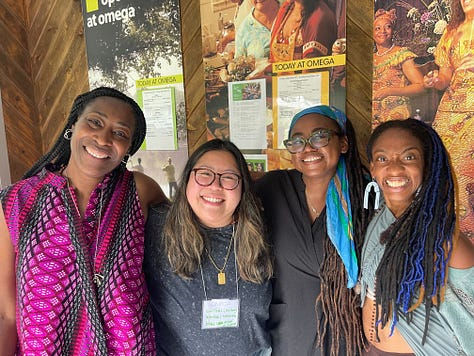

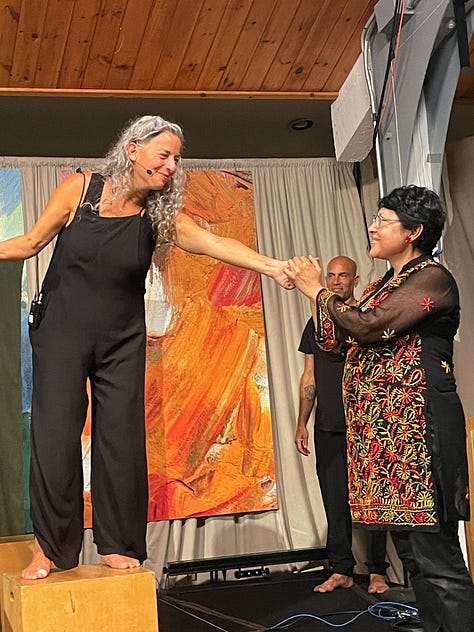
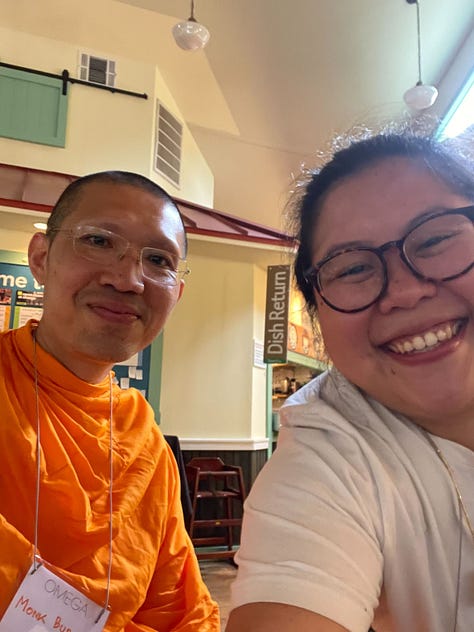
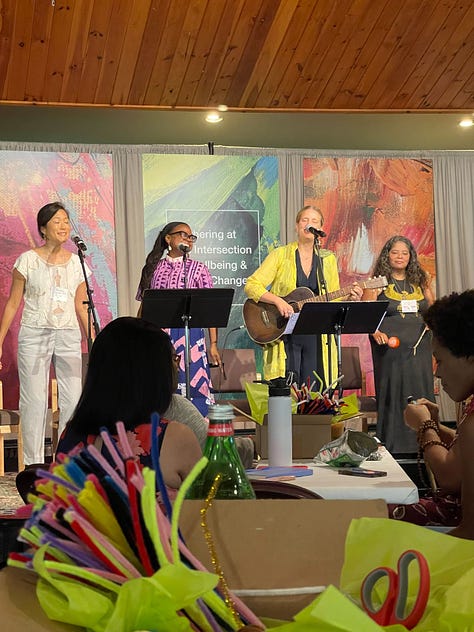
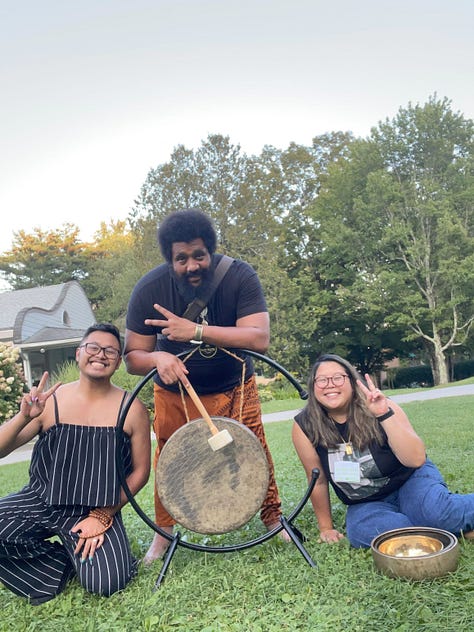
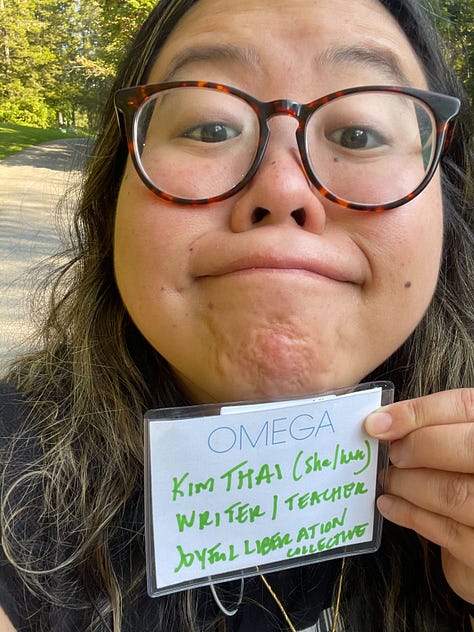
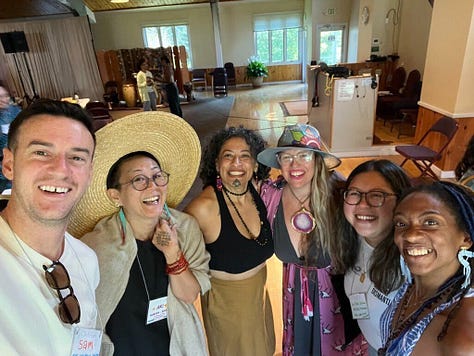
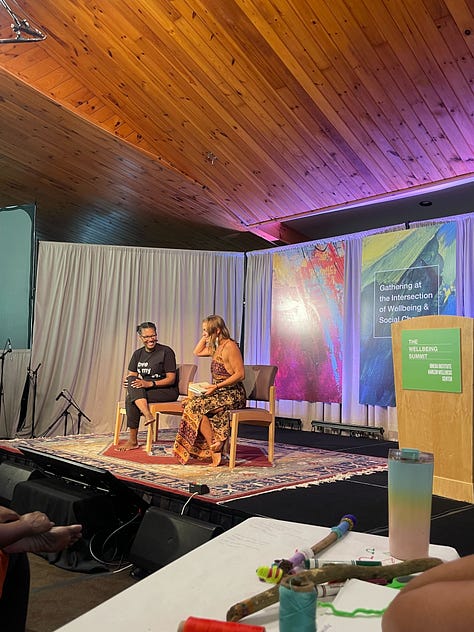
I was having lunch with Morley and we started talking about Bhutan, the happiest country in the world — and one of the most magical places I’ve ever been. She shared with me that she once was on retreat with the former King of Bhutan and he had told her that everyone needs two hearts — one heart we are born with and another heart to step in when our first heart breaks. But he said for her — an artist, a healer, a changemaker — she needed three hearts because we feel so deeply. That our first and second hearts will break ever too often and that we need a third to keep going.
To me, that third heart is community, sangha. Is the knowing that you are not alone in this work, in this fight for a better humanity — especially when it feels like the world is impenetrable and you are about to be swallowed whole. And that there are other folks in the trenches who believe we can live in a world where we prioritize care, community and compassion.
Not to be all Buddhist about it, but…
Pema Chodron writes, “Hope and fear come from feeling that we lack something: they come from a sense of poverty. We can’t simply relax with ourselves.”
It is remembering the poverty in our humanity that exists and persists that breaks my heart so widely these days. It is why I have cultivated such a strong practice of living in the here and now — because it’s too hard to see and believe in a future that won’t crush me. So I understand this wisdom that Pema Chodron shares with us. This idea that hope makes us preoccupied with the future, not allowing us to be in the present, that hope is at its core is not accepting the reality of how things are. To actively be in a state of delusion and that hope brings more suffering.
I have experienced that, but in my body — in my bones — I also know that hope arrives when I am most present, when I feel the most safe. Allowing myself to hope is so rare, but this Summit, and all the moments that created it, gave me the space and safety to do that.
And not only did it feel good — it was empowering, motivating, healing. A theme that kept on coming up all week, was how do we create a new paradigm? I am realizing in this moment, for me, it is to believe in hope again.
And that the suffering, even if it is overwhelming, is worth it (most days). That being human is worth it — even with all of its hope and heartaches.
A bit more wisdom
Here are some mic drop quotes from the Summit that deserves to be shared more widely with the world:
“If we don’t understand that wellbeing is social change, we will fail at our enterprise. We can’t be accountable if we’re not responsible. And we can’t be responsible if we’re not embodied.” — rev. angel Kyodo williams Roshi
“We are the midwives of what common people think is impossible.” — Reggie Hubbard
“I refuse to put a face to my oppressor so I can focus on people’s humanity.” — Monica Aleman
“You can’t think your way through heart problems.” — Leslie Booker Walker
“Fear contracts our awareness. Love expands our awareness.” — Richard J. Davidson
***
Contemplations
What is your relationship to hope?
Do you stop yourself from hoping? From feeling excitement for a potential future? What is holding you back?
What are the conditions you need to feel safe enough to hope?
Being a writer requires a certain level of drive, love, tenacity and faith. So if you’re feeling inspired and find value in my work, please consider sending me $1.11 to encourage me to keep going.
Your love motivates me to keep this newsletter going, and allows me to keep my writing practice as an act of service. I’m committed to sending a portion of any monthly donations to a social justice organization I am supporting. Your investment helps support that donation — from protecting abortion access to healthcare services for trans youth. So sending me a few dollars via Venmo (@kthai6) with the note “✨ ✨ ✨” is a way of telling my heart to keep writing, and a small little affirmation from you to me that I am on the right path. It also helps me understand the value of my writing as I continue to navigate capitalism as a writer and teacher. If you’re open to supporting my writing on a more consistent basis, consider subscribing to my paid plan here. Thank you for your contribution so I can continue to make my writing be of service 🙏




Thank you for writing this Kim! I could really relate. I can relate to the stress of “no productivity” when choosing to go on retreat. I also appreciate the story of the yoga studio. I had a similar experience a few weeks ago with Chogyam Trungpa (who is long dead). I have been heavily drinking the cool-aid, studying his books, gathering with his students and his “Shambhala” community for almost 8 years. Reading more recently about sexual misconduct, emotional abuse, manipulation, sexism, white supremacy, substance abuse among other things happening in his community really bothered me, and left me feeling betrayed and with nothing to hold on to. The one community I have trusted and been a part of for almost a decade is not who I thought they were. In a panic, I signed up for a retreat with Lama Rod, who is a buddhist guru and social activist. I was extremely hopeful for the retreat, and desperate for guidance and community. I love how you articulate the pain of hope. Injustice and broken systems hurt so badly because I have hope for something better. I am not comfortable with the way things are. I believe we can do better. Being with Lama Rod was life changing, and it made me think a lot about my own identity, especially as a Jewish Autistic person. He gave a new light and perspective to my view of Buddhism. I now know that even when it comes to my beloved Buddhist community, I can’t take anything at face value, and even the dharma can be racist, sexist, homophobic, able-ist, and so on.
The retreat also let me know I am not alone, and that there are people doing the work. Similar to your conference experience, I was pleasantly surprised, as I have also become more cynical with lower expectations of others, as a defense mechanism, just as you described. Part of the healing work as you say is to open the heart back up to allow hope for something better, and to allow trust, even after being betrayed and disappointed in the past.
“ I know that hope brings more suffering. I have experienced that, but in my body — in my bones — I also know that hope arrives when I am most present, when I feel the most safe.”
This is a whole mic drop. Deep bow to you Kim. I am honored to know you.
I want to share something I learned from Lama Rod. I’ll paraphrase, “the essence of Buddhism is to choose not to be comfortable in samara, because we know freedom is possible”
One more Lama Rod quote: “there is no liberation without the body”
I can’t wait to see you in the heart sutra class tomorrow Kim!
beautiful piece kim